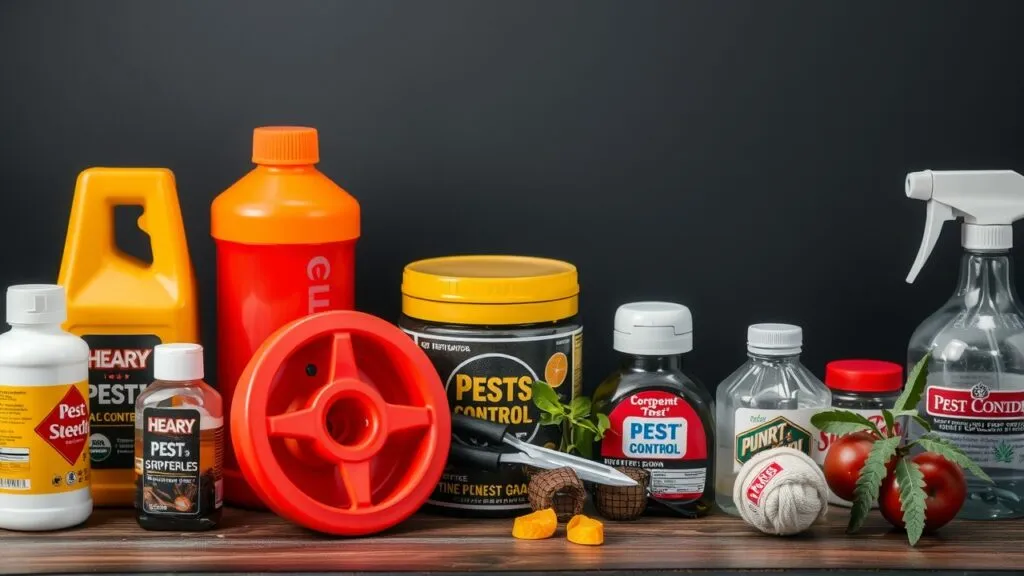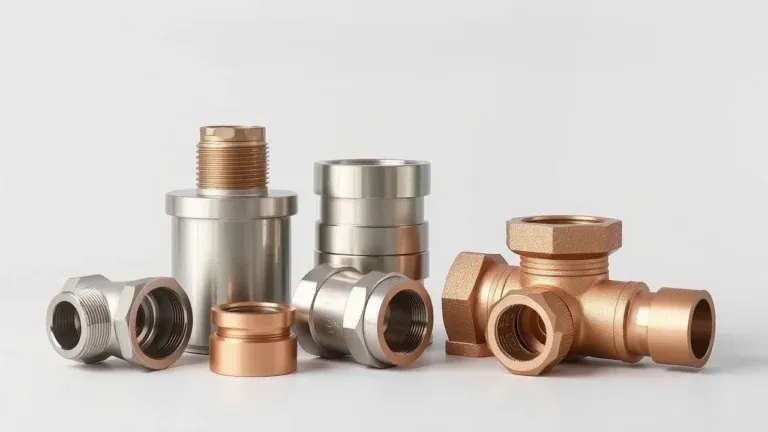Types of pest control services vary greatly depending on your needs. Residential, commercial, and Integrated Pest Management (IPM) solutions offer different approaches to pest control treatment and methods.
What Are Pest Control Services?

Pest control services help manage and treat pests in homes, businesses, and other places. These services keep our spaces safe and healthy by stopping damage from pests.
Good pest management includes many strategies. It’s important for property owners to know how these services can protect them from infestations. Infestations can lead to health problems or damage to buildings.
There are different types of pest control methods today:
- Preventative Measures: These actions happen before pests invade. They include regular inspections and keeping places clean.
- Reactive Solutions: These techniques are used after pests show up. This includes things like using insecticides or fumigation.
- Integrated Pest Management (IPM): This is a sustainable method that combines monitoring with less pesticide use for long-lasting results.
- Specialized Treatments: These focus on specific pests, like termites or rodents, using targeted approaches.
By knowing about these options, property owners can choose a pest management plan that fits their needs.
Importance of Pest Management
Pest management protects not just buildings but also the health of people living or working there. Pests can spread diseases or contaminate food. Good pest control helps keep residents safe and maintains the value of properties.
Investing in quality pest management can save money over time by lowering the risk of damages caused by infestations. A proactive approach gives peace of mind, knowing your space is safe from pests.
Overview of Types of Pest Control Methods
Understanding the different methods available helps property owners make good choices:
- Preventative Measures
These actions stop infestations before they start. Examples include sealing cracks in buildings and practicing good cleaning habits. - Reactive Solutions
These methods deal with active infestations using techniques like fumigation or focused pesticide use when immediate action is needed against issues like bed bugs or cockroaches. - Integrated Pest Management (IPM)
This method combines careful monitoring with limited pesticide use for sustainable results. It’s good for those who care about the environment and effective treatment. - Specialized Treatments
These methods target specific challenges posed by certain pests like termites or rodents with strategies designed just for their behaviors.
By looking at all these choices—from traditional chemical solutions to eco-friendly ones—property owners can make smart decisions based on their unique situations in California’s varied environments, such as the San Diego County areas where local conditions play a big part in choosing the best pest control methods!
Types of Pest Control Methods Explained
Preventative Pest Control Services
Preventative pest control is all about keeping pests away before they even show up. This includes simple actions like sealing entry points and keeping places clean. For example, filling cracks around doors and windows can stop mice from sneaking in. Also, regular sanitation services can get rid of food that attracts pests.
The benefits are pretty big. First, it’s usually cheaper over time because it stops infestations from happening in the first place. When people take care of potential problems early, they save money later on expensive treatments. Common pests that these methods keep at bay include rodents, cockroaches, ants, and spiders.
Reactive Pest Control Solutions for Infestations
Reactive pest control kicks in when you already have a pest problem. This means taking quick steps to get rid of pests using things like insecticides or fumigation. For example, if bed bugs invade your home, you’ll need a special bed bug treatment to eliminate them.
The good side of reactive pest control is that it works fast. You can see results quickly and get relief from unwanted bugs or rodents. But there are some downsides too—some treatments can harm the environment because they use chemicals. Homeowners and businesses should think about their options based on how bad the infestation is and pick the best solution for their needs.
Integrated Pest Management (IPM): A Sustainable Approach to Pests
Integrated Pest Management (IPM) combines different ways to deal with pests while being careful with chemical use. The main ideas behind IPM include regularly checking for pests and using eco-friendly controls whenever possible.
This method is great for people who want to make choices that help the planet. IPM uses natural controls, like bringing in predators that eat pests, along with physical barriers like traps. It also uses chemicals only when needed. By following this balanced approach, people can manage pests responsibly without relying too much on harmful products.
Specialized Pest Control Services
Termite Control
Termites can cause a lot of damage to homes and businesses. That’s why termite control is so important. The process includes inspection, treatment, and prevention. First, a thorough termite inspection helps find these pests before they cause harm. After that, different termite treatments are available, like liquid insecticides or baiting systems.
For homes, residential pest control services often use preventive measures. They might apply soil treatments around the foundation to keep termites away. Commercial properties may need special termite control plans since they are bigger and face more risk.
Here are some common treatment options:
- Liquid Insecticides: Works fast but may need reapplication.
- Baiting Systems: Good for long-term solutions but takes time to see results.
It’s best to talk to a professional pest control company that knows how to manage termites effectively. They can help you find the right solution for your situation.
Bed Bug Extermination
Bed bugs are sneaky little pests that hide in tight spots and breed quickly. To get rid of them, effective bed bug extermination is key. This means using proper inspection and treatment methods.
A detailed bed bug inspection can help spot problems early on. Treatments can include heat methods or chemical sprays, both of which target bed bugs directly. Heat treatments kill all stages of bed bugs but require special gear, while chemical sprays focus on specific areas.
Common treatment options are:
- Heat Treatment: Kills bed bugs at high temperatures.
- Chemical Sprays: Targets adult bed bugs where they hide.
Choosing residential pest control services with experience in bed bugs is important. Doing it wrong can lead to bigger issues later on.
Rodent Control
Rodents like mice and rats can be a real health risk since they spread germs and diseases. Effective rodent control starts with knowing what types of rodents might invade your home, like house mice or Norway rats.
Here’s how you can tackle rodent issues:
- Prevent Entry: Seal up holes around your home.
- Trapping: Use snap traps or glue boards for quick removal.
- Poison Baits: These need careful placement away from pets or kids.
- Clean Up: Keeping areas clean will help stop rodents from coming back.
Consulting with pest control experts is smart because they know how to handle different rodent problems safely and responsibly.
Other Specialized Services
Besides dealing with common pests like termites, bed bugs, and rodents, many pest control companies offer additional specialized services:
- Bird Control: Use nets or spikes on ledges to keep birds away.
- Wildlife Removal: Safely capture animals like raccoons or squirrels that invade homes.
- Insect Control: Manage stinging insects such as bees and wasps without harming useful species.
If you’re worried about chemicals affecting your health or the environment, consider eco-friendly pest control options. These use natural substances to manage pests without causing harm inside your home.
By understanding these various pest control services, homeowners and business owners can make smart choices for their specific needs while ensuring safety both indoors and outdoors.
Choosing the Right Pest Control Service
Factors to Consider
When you need to pick a pest control service, think about a few key things. First off, your budget is super important. Prices can change a lot based on what you need. So, make sure to find a company that fits your wallet but still does a good job.
Next, look at the type and severity of pests. Different pests mean different solutions. For example, ants might need bait, but termites could require special treatments like barriers or baits. Knowing what kind of pest problem you’re facing helps you choose better.
The property type matters too! Homes and businesses often require different methods because they have different rules and safety concerns.
Don’t forget about environmental concerns. If you’re worried about chemicals, many services offer green options that are safer for the environment while still getting rid of pests.
Finally, consider health and safety. Check if the products they use are safe for kids and pets.
Decision Tree
To help you decide on pest control services, think about these steps:
- Do you need preventative pest control? This stops pests before they come.
- If pests are already in your home or office, look for reactive pest control solutions.
- Think about integrated pest management (IPM). This approach combines different strategies to handle your specific issue.
- Finally, see if you need any specialized services, like termite checks or bed bug removal.
Using this decision tree can help clear up what type of service is best for your situation.
Finding a Reputable Company
Choosing a reliable pest control company is key for effective treatment:
- Check their licensing; good companies should follow local laws.
- Make sure they have insurance too! This keeps everyone safe if something goes wrong.
- Read online reviews to learn what others think about them.
- Ask for several quotes so you can compare prices without giving up on quality.
- Look at how much experience they have with issues like yours; seasoned experts usually handle problems better than newcomers.
By thinking through these factors when choosing among pest control services, you’ll find one that meets your needs and fits your budget while keeping health standards high during treatment!
Environmental Impact of Different Methods
Environmental Impact Assessment
Different pest control methods have different effects on our planet. Here’s a quick look:
- Chemical Pest Control: These products can work fast to get rid of pests, but they might also hurt helpful bugs and mess up soil and water if not used right.
- Eco-Friendly Pest Control: This method uses natural or less harmful chemicals. It often includes things like changing habitats and using bugs that eat other pests.
- Integrated Pest Management (IPM): This approach mixes different techniques. It includes checking how many pests there are, using plants that resist pests, and only using pesticides when needed. The goal is to use fewer chemicals while still controlling pests effectively.
Knowing these impacts helps homeowners decide which pest control service fits their eco-friendly goals.
Eco-Friendly Alternatives
If you want to be kinder to the earth while dealing with pests, here are some eco-friendly choices:
- Organic Pest Control: Uses naturally sourced substances that are less harmful than synthetic chemicals.
- Natural Repellents: Things like essential oils can keep pests away without being toxic.
- Green Pest Control: Focuses on keeping pests away through cleaning and sealing entry points rather than just relying on chemicals.
- Biological Pest Control: Involves bringing in natural enemies of the pests, like predators or parasites, to keep their numbers down.
Choosing these options helps protect your home while also being better for the environment by reducing chemical use in nature.
Home Maintenance for Pest Prevention
Keeping your home pest-free is super important. Start with some good home pest control habits. First off, cleanliness is key. If your living spaces are clean, pests will have less food and fewer places to hide. Regularly vacuum and wipe down surfaces to get rid of crumbs and spills that attract pests.
Next, think about proper food storage. Use airtight containers to keep food safe from insects and rodents. This helps keep your food fresh and stops infestations.
Also, sealing entry points around your home is a must. Check windows, doors, and any cracks in walls where pests might sneak in. Use caulk or weather stripping to block these spots.
Finally, regular inspections can help you catch pest problems early. Look in places like the basement, attic, and garage for signs of pests like droppings or nests.
Yard and Landscape Maintenance
Your yard matters when it comes to keeping pests away from your home. Here are some landscaping tips:
- Keep plants trimmed back from the house.
- Remove standing water to stop mosquitoes from breeding.
Using environmental pest control methods helps too! You can plant natural repellents like marigolds or use cedar mulch, which keeps bugs away while making your yard look nice.
Preventative Measures Based on Pest Type
Ant Control
Ants can become a real problem if you don’t manage them right. Good ant control methods include keeping both inside and outside areas clean. Also, seal off their entry points just like you would with other pests.
Rodent Control
For rodent prevention, clear out clutter where mice might hide. Make sure all food sources are secured tightly—this includes pet food! For effective rodent control methods, place traps along known paths instead of just using poisons that can harm kids or pets.
Cockroach Control
Cockroaches love warm places with easy access to food scraps. So cockroach prevention strategies should focus on thorough cleaning routines. Take out trash regularly and seal gaps around pipes in kitchens or bathrooms where they might sneak in unnoticed.
Additional Preventative Strategies
Routine inspections are really helpful for catching potential pest problems over time. This way, you can deal with issues before they become big headaches!
Natural repellents work great as a way to keep common pests away without harsh chemicals—essential oils like peppermint oil can help against ants if sprayed along their trails!
To maintain a pest-free environment:
- Stick to regular cleaning.
- Keep areas well-ventilated to avoid moisture buildup.
- Try DIY pest control techniques like homemade traps with stuff lying around the house!
By using these tips for both indoor and outdoor spaces, you’ll make your home less welcoming for unwanted guests while enjoying peace at home!
Frequently Asked Questions
What types of pest control products are available?
Pest control products include pesticides, insecticides, and rodenticides. These chemicals target specific pests. Traps and barriers also help manage pest issues. Many people use manual removal methods too.
How do I find pest control near me?
To find pest control services near you, search online with terms like “pest control near me.” Check local listings or ask for recommendations from friends and family. You can also read customer reviews to evaluate companies.
What is the cost of pest control services?
The cost of pest control varies by service type and severity of the infestation. One-time treatments typically range from $100 to $300. Monthly maintenance services often cost between $30 and $70. Always get a free pest control quote for accurate pricing.
Are organic pest control options effective?
Organic pest control options can be effective against many pests. These methods often use natural ingredients that pose less risk to people and pets. Consider these solutions if you want an eco-friendly approach to pest management.
How do I choose a reputable pest control company?
To choose a reliable company, check their licensing and insurance. Read customer reviews online for insights into their work quality. Ask for multiple quotes to compare pricing and services. Look for companies with experience in your specific pest issue.
Are pest control treatments safe for children and pets?
Safety is super important when it comes to pest management. Many modern treatments are made to be safe around kids and pets if used properly. Always ask your pest control provider about what safety steps they take during treatment.
What is integrated pest management (IPM)?
Integrated Pest Management (IPM) is a method that uses different ways to keep pests away while being safe for people and nature. It usually involves watching for signs of pests, using natural controls like their enemies, and applying chemicals only when needed.
Sustainable Pest Control Solutions
- Explore eco-friendly products that minimize chemical use.
- Use natural predators like ladybugs to manage pests.
- Implement exclusion methods to block pests from entering homes.
- Opt for Integrated Pest Management (IPM) for long-term results.
Pest Control Services for Various Properties
- Residential Pest Control: Tailored treatments for homes and apartments.
- Commercial Pest Control: Programs designed for businesses, restaurants, and offices.
- Emergency Pest Control: 24-hour services available for urgent infestations.
- School and Hospital Pest Control: Specialized plans focusing on health safety.
DIY Pest Control Tips
- Use traps effectively to manage common household pests.
- Apply granulated insecticides in garden areas for ants or roaches.
- Clean regularly to reduce food sources for unwanted pests.
- Seal entry points around the house to prevent infestations.
Common Pest Types Addressed
- Rodents: Mice and rats can be managed through trapping or rodenticides.
- Insects: Cockroaches, ants, and bed bugs require specialized treatments.
- Termites: Regular inspections are critical to prevent damage from termites.
- Seasonal Pests: Prepare for insects like mosquitoes during warmer months.
Related Topics
- Types of Pest Control Methods
- Types of Pest Control Treatments
- Types of Rodent Control
- Types of Termite Control
- Types of Bed Bug Extermination
- Types of Preventative Pest Control
- Types of Reactive Pest Control Solutions
- Types of Pest Control Products
- Types of Eco-Friendly Pest Control
- Types of Pest Control Companies
- Types of Pests
- Types of Home Pest Control
- Types of Yard Pest Control
- Types of Sustainable Pest Control Solutions
- Types of Pest Control for Various Properties



Types of Pest Control Services: Residential, Commercial, & IPM Solutions